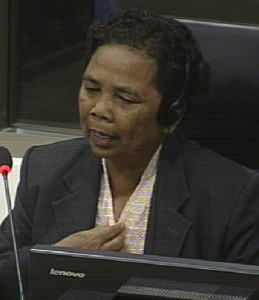“They Completely Eliminated the Feeling of Family Relationship”, Civil Party Says
Today, Civil Party Preak Sokhoeum concluded her testimony. She provided information about the authority structure in her unit. She gave more details about her arranged marriage as well as the rape by her husband. Next, two Civil Parties followed to give their statement on harm and suffering. Civil Party Kul Nem told the court how he was forced to marry despite having a fiancé. His wife had two miscarriages: one during Democratic Kampuchea and one in 1979 that he attributed to her being overworked during the regime. Lastly, Civil Party Nget Chat provided information about the arrest and alleged execution of her husband and family. She told the Chamber that she was arranged to marry another man three or four days after her husband disappeared.
Preak Sokhoeum
All counsels except Khieu Samphan Defense Counsel Ms. Guissé were present. The floor was handed to the Co-Prosecution to examine Civil Party Preap Sokhoeum. Senior Assistant Prosecutor Vincent de Wilde asked her about her age. Mr. de Wilde said that it was the fifth year of the monkey when taking her approximate age. He asked her whether it was possible that she was 60 instead of 62. She replied that she was 62 years old when counting it from the year of the monkey. She could not recall clearly how old she was during Democratic Kampuchea. She said she was “a little bit mature” in 1975. She was arranged to be married a few years after turning 18.[1] Mr. de Wilde asked whether she was 18 when she was married and 20 when her child was born, as she had indicated in her Written Record of Interview.
Composition of the Group
She said that there were no children in her unit and only one Chinese person and no Cham. There were some Cham people in the unit. They were “no longer consider Cham. They were not allowed to practice their religion.” They had to eat the same food as everyone else. Ret was married to a person called San, but she could not remember the date of their marriage. She did not know whether San was the real name or an alias. Ret told her that she did not know about the marriage, as she was called without being aware of the arrangement.
The Civil Party did not receive any sexual education before her marriage, except that she should sleep with her husband. They told her that they should sleep with skirts at night, but since she did not have any, she wore her pants.
“After I got married, my feeling was unsettling.” She was afraid to be taken away and killed on the one hand, and on the other that he would rape her.
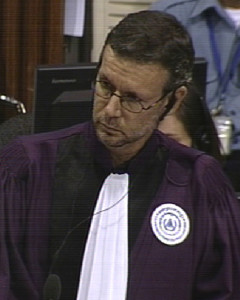
International Senior Assistant Prosecutor Vincent de Wilde
Mr. de Wilde quoted her statement, in which she had said that she was the “property of Angkar.”[2] She explained that they were prohibited from going anywhere freely and had to fulfil the work quotas. He asked about her statement “that war casualties could be married to beautiful women.” She said that she realized only after the marriage that her husband was handicapped. “Otherwise I would have slept.” Mr. de Wilde then inquired about Proeung. Ms. Preap Sokhoeum recounted that Proeun refused to marry the assigned man. “She said that she was beautiful and that her husband was short and had a slim built.” She was arrested and both of them disappeared. People said that she was put on an oxcart. “After hearing that, we just kept our mouth shot.”
She did not witness Proeung’s arrest herself.[3] There were cases where people proposed to Angkar, but Angkar turned the proposal down.
Oeun had a large built but “was not beautiful.” He and her wife did not consummate the marriage and were sleeping separately in a hammock and bed. The news reached Angkar and they were re-educated.
Mr. de Wilde asked about her statement that this couple was spied on.[4] She replied that she met Mean but not Oeun.
At the time, many people were killed, she said. She only knew about Comrade Proeung and Yoeun who were put on a cart and taken away. One woman, whose husband was a monk, was also taken away and killed. However, her husband was spared. “Initially they only killed the woman and the husband was spared, but later on couples, both husband and wives, were killed.” The woman whose husband was a monk was called Chean, but she was not certain of this. The couple did not get along well. After the wife was taken away, her husband sang the song “A Lonely Bird Flying Alone.” When he was asked why he sang that song, he had told them that it was because his wife was taken away and he was lonely. He was then also taken away. Mr. de Wilde said that she had provided the name Ren in her statement.
After couples got married, “many of them got along well, because they thought that they were arranged by Angkar, so they had to live together and they lived together well.” There was a minority who did not get along well. “In such cases, people refused to get married. Her mother talked to her at a later stage and told her that she had to marry. She told her mother that she was afraid that her second husband would “ruin [her] life again” and that she was afraid he would be a gambler. Her mother told her that she wanted to attend her marriage this time, since she was unable to during the Khmer Rouge.
There were no ajar during the Khmer Rouge, which was different to the traditional way. The second wedding followed a detailed traditional setting, so it gave her some comfort. Her wedding was attended by hundreds of people, so she had confidence in the marriage.
Lon Nol Soldiers
In 1973, Kampong Thom was captured. Soldiers were sent to that area, Ms. Sokhoeum recounted. There was a well that was used for religious purposes. They found dead bodies in there. From 1975 until 1977, they searched for people with affiliations to Lon Nol. Her brother, who was a soldier under the Lon Nol regime, was arrested and killed. The wives were taken away and killed as well. Her brother was a Lon Nol soldier at Kampong Cham. When he was evacuated to his native village, he was searched for and killed. In 1977, he had already been taken away and killed. She heard that her father was also to be taken away and killed. Since she was sick, however, she stayed behind. Her father and siblings were all taken away and killed. “I was not sick and stayed behind, I would also have been taken away and killed.”
An elder sibling of hers was also killed.
Authority Structure
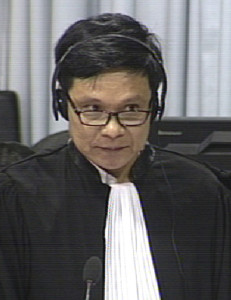
Nuon Chea Defense Counsel Liv Sovanna
The floor was granted to the Nuon Chea Defense Team. National Defense Counsel Liv Sovanna inquired about Proeung. She replied that she only knew one person who was called Proeung and close to her. The unit consisted of three smaller unit. There were 96 people altogether. After Proeung was transferred, Tao was put in her place to lead the unit.
Mr. Sovanna then asked about a person called Ly. She replied that there were both female and male Lys in other units. There were no other people called Ly in her unit. She knew Ryn who was in charge of a bigger unit. He was taken away and killed. Ms. Sokhoeum was in charge of twelve people in her unit.
Mr. Sovanna asked why she said in her application that Proeung was the chief of the unit and Ly her deputy.[5] She replied that she had said that Ly was in charge of general matters in the big unit, while Proeung was the chief in the unit that directly supervised her. Ty was the deputy chief who was also supervising her. Mr. Sovanna repeated the question and she repeated her answer. Mr. Sovanna asked about Ren’s role in her unit.[6] She replied that he was a unit chief, but not her unit chief.
Mr. Sovanna asked whether some of the couples were fiancés and had proposed to get married. She replied that there was only one couple that proposed: Prum and Chen Samnang. Prum held a senior position and could therefore request to get married.
Mr. Sovanna asked whether there were couples who refused to attend the marriage. She replied that they followed bits and pieces and did not have all information. She was given some clothes when she realized that she was sent to get married. “I still had the feeling that I was gathered among other people to be sent and killed. I never thought for a moment that I was arranged to get married.” Thus, she did not make any refusal.
At the ceremony, they were sitting at a long table and there was a speech. “Of course the speech was nice to listen to.” They called out Comrade Keo and her, Poa, to match them.
She required about her husband. She was told that her husband walked in an “unbalanced way”, which was how she realized that he was handicapped on one leg. He could not stretch three fingers. “Another woman said that he had also poor eye sight.” Thus, she learned that he was handicapped.
At this point, the President adjourned the hearing for a break.
Handicapped Husband
Mr. Sovanna inquired whether her friends made fun of her husband, because he was disabled. She replied that they pitied her when they found out that she had a handicapped husband. She noticed that the women who were wedded on the same day as her cried. “I did not know the reason why they cried.” She did not know whether Prum Yun got married at the same day as hers, since she was in a “different ministry” than hers. Mr. Sovanna asked whether she thought that they wept because they thought that they were taken away to be killed or because they were getting married. She replied that they wept, because they were frightened and were afraid that they would be taken away. The two or three women who wept close to her did not know where they would be taken to. When they were weeping, Ren came in and told them that they would be arranged to get married.
When they were ordered to marry, she did not dare to oppose the decision, because she was afraid of getting killed if she did. “I had no choice besides weeping.” She asked her husband not to touch her. “I followed my father’s word. He told me: do not let any man touch you except the man who was arranged to marry you by us.”
Before Ren, there were also other cases of people who were killed. That was the reason why she felt fearful. She did not witness their executions, but they disappeared. Comrade Proeung got married before her. She could not recall how many months before her Ren got married. Ren was still there when Ms. Sokhoeum married, but was taken away later. She did not tell the Khmer Rouge that she did not get along well with her husband.
Rape
Comrade Tao presided over a meeting. He said that anyone who was arranged to get married must follow Angkar’s orders. She did not know when Ren was arrested. Tao raised Ren’s disappearance in the meeting. Some of them started to conclude that Ren disappeared, because s
he did not get along well with her husband.
She wept when she heard that she was arranged to get married. If she had known that she was arranged to get married beforehand, she would have escaped.
Mr. Sovnna moved on and asked about Comrade Proeung.[7] She replied that a woman fled and they caught her. This person was not Comrade Proeung, however. Mr. Sovanna said that this contradicted her statement, since she had mentioned a woman called Proeung who did not get along well with her husband and fled.
Mr. Sovanna asked about the number of couples that attended the wedding, since she once had said that 15 couples attended her wedding and another time that there were 12.[8] She replied that she may have been inattentive and she apologized for potential discrepancies. She said that she did not make any commitments during the wedding. Mr. Sovanna said that she had said in her statement that she made a commitment.[9] She insisted that she did not make any commitment, but that one person made a commitment representing the group. She got married when the cotton fruits were ripe, so she estimated that it would have been in November or December during the full moon week. This could have been in late 1976 or early 1977.[10] Mr. Sovanna said that she had not mentioned that she was monitored,[11] and that she became more comfortable with her husband before sleeping with him.[12] Mr. Sovanna asked why she had failed to mention that she was monitored in the documents and only mentioned it in trial. She said that she was being asked to speak in details here in front of the court, which was why she mentioned it now. “I lied a lot to the militiamen,” she said, so that she could get out of the house. “When he came to visit me, as I said I was exhausted, and he put his hand on my body.”
Inconsistencies
Mr. Sovanna said that she had told in her statement that her husband chased her into the house, while she had said previously that she was asleep when he started touching her.[13] She replied that he started raping her when she was asleep. He tried to unbutton her shirt and when he tried to open her bra, it snapped and he removed it. On the first night, her husband did not do anything.
Mr. Sovanna said that she did not mention the rape in one of her documents.[14] Mr. Sovanna read another document, in which she had not mentioned the rape.[15] She said that she did not speak about the rape, because she was “still shy about it.” She explained: “I did not want to speak about my internal issues.”
She could not recall who filled out her form at Ad Hoc, and later she spoke to Youk Chhang. Later she was told to speak out and not to be shy about the rape. “I was told that if I was shy, there would be nothing as evidence.”
Her husband, she said, was “not a brutal person. If he was a brutal person, he would have raped me on the first day.” She said she wanted to clarify that her husband was an innocent man.
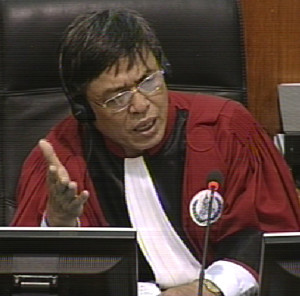
Trial Chamber President Nil Nonn
There was a discussion about time issues in the Chamber. At some point, the presiding judge Nil Nonn stated that they had registered the “mocking smile” by Nuon Chea Defense Counsel Victor Koppe and that they would have to be strict on time.
Mr. Koppe said that she had said nothing about rape, about them telling her to consummate the marriage, nor about people monitoring her. He asked her why this was the case. International Lead Co-Lawyer Marie Guiraud alerted the chamber that the documents did not have the same nature at all. There was a brief discussion with Judge Claudia Fenz, who reminded the defense counsel that the question had been answered already and that he should directly go toward the question, as he had said his questions would lead to, as to whether he was coached by anyone.
Mr. Koppe said that this led to the question of whether she was coached by Ad Hoc, for example. Mr. Koppe asked why she would say that her husband was a kind person to DC-Cam and then a different story today. She replied that she had said that her husband was a kind person. “If my husband had been a cruel person, he would have raped me on the first night.”
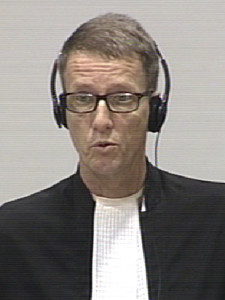
Nuon Chea Defense Counsel Victor Koppe
She was asked after her marriage by her husband why she tried to keep her virginity, since they had already been married. Mr. Koppe asked whether anyone could confirm this story, which she denied. She explained that the questions were asked in stages, so she also gave her answers in stages. “No one forced me to give that answer.”
Back to the Authority Structure
She said that Proeung was the chief of the big unit, while Ly was the unit chief and Ms. Sokhoeum was a team leader. She was a member of the big unit. She did not remember which year she was assigned to be member of the big unit. She was a member of the big unit leadership together with Proeung and Ly.
There were no numbers designated to the units. They referred to the units as Proeung’s Unit and Ly’s Unit, for example. Comrade Ly was above Proeung. Ly was responsible for all women in Kampong Praling. Comrade Ly and Comrade Sor gave the assignments to them. They referred the orders of Angkar, but she did not know from where. Ms. Sokhoeum said she never blamed her team members if they could not fulfill a work quota. There was no one, she said, who made mistakes in her unit. “Although they may be a little bit lazy or become a little bit sick, I did not report them to the upper level.” She tried to encourage them to recover soon from the illness. She never intended to deprive anyone from food, and the food ration was prescribed from above.
Some places where they worked were around 500 meters away, some two kilometers. During the initial stage, they cat the cotton in the area adjacent to the village, but later they were assigned to a location that was further away.
Timeline
The day of her marriage, she could not recall it in comparison to the date of the international calendar, but she estimated that it must have been in October, November or December. To her recollection, it was in late 1976 or early 1977. Her child was born during the regime, but she could not remember when exactly. She said it must have been in December or January. She gave birth when people harvested the low-season rice. Her child was around one year old when the regime collapsed. She could not recall the exact months and years, but she could recall that they were allowed to meet each other four times. They did not consummate the marriage during these four times. A month later, she was called to go to her husband’s place under the pretext that he was sick. She told them that she did not want to go alone, so they assigned Socheat to accompany her. She went there after rice had been harvested.
Mr. Sam Onn asked who ordered her to live with her husband. She tried to defend herself not to have sexual intercourse with him. “Talking about the rape that occurred, my husband tried to explain to me […] that if we did not consummate our marriage, we would be in trouble.” She emphasized that no one ordered them to consummate their marriage, however.
She said that since she had lost her virginity and they were married, they would live together: “Both of us should live together as husband and lives. No one forced us.” Her husband tried to console her. “He told me that Angkar required us to live together and we should live together.” ‘
Mr. Sam Onn asked about the person called Tao. She recounted that Tao was not present when the unit was first created. He or she emerged when people started being arrested. “When Tao came, that person was very brutal.” He or she was present in every meeting.
When Tao came, strict rules regarding work were implemented. They had to work regardless of weather. “It was very tense working condition.” Tao monitored their work. If they could not fulfill the assigned timing, they would be invited for a re-education session. Tao set the amount of work to be fulfilled every day. To his knowledge, Tao was supervising the general affairs. “He was the one who could call any one of us to be re-educated. And he had the right to remove anyone.”
He did not know whether Tao was superior to Sor, since there was no formal announcement. The latter was more lenient. With this, Mr. Sam Onn concluded his line of questioning and Ms. Sokhoeum was given opportunity to make a Civil Party Impact Statement.
Statement on Harm and Suffering
The Civil Party then gave her impact statement.
Civil Party Preap Sokhoeum
I’d like to speak about the suffering I endured under the three years and eight months regime. I was young. I was separated from my siblings and my parents I was not allowed to have contact with my relatives […]. We were fully disconnected and we did not know what was going on with each other. They completely eliminated the feeling of family relationship, and that hurt us, since I was anxious to know about the livelihood [of] my family members and relatives. It pained me the most that I did not know or did not live together with my family members.
She then proceeded to talk about harsh working and living conditions.
I could sleep three hours the most out of one full day cycle and we were deprived of our freedom. […] . We lived like animals. […] The living condition was so misery under the regime.
She then pointed to her marriage and the disappearance of her husband.
Another point that I like to talk [….] about is my marriage. I was arranged to marry and I was forced to have intercourse with a person that I did not like and I did not want to have intercourse with. That hurt me physically and emotionally. In addition, when I became pregnant they did not allow my husband to look after with me […]. My husband was taken away and killed. […] The unit chief threatened to take away my baby and kill [it]. They accused my baby of being the child of a traitor. I begged them to spare my baby and I said that if they were to kill my baby they were to kill me first. […] My baby did not know anything about the policy.
She explained how she became scared when a cadre arrived with a rope, since she thought she would be taken away and killed. She was spared, but it still had an impact on her life.
The pain remains with me today. And worse than that, all of my family members died, none survived. Even my nephews, they all disappeared and [are] gone. And I remember all this misery for my entire life until I die. I cannot forget it. […] I’d like to advise our compatriots not to have such leaders in the regime. People were used to engage in hard labor. People were separated from their relatives and family members and we do not want to see such a regime return.
She asked “why the leaders only engaged in killing the people, in starving, mistreating the people, and that people were living like animals? Their freedom was deprived and the food was insufficient. […] Why did they create and love such a regime?” The president informed the Civil Party that the accused exercised their right to remain silent. He thanked Ms. Preap Sokhoeum and dismissed her. He then announced that the Civil Party Impact Statements would be heard: 2-TCCP-1066, 2-TCCP-1067 and 2-TCCP-1068.
Civil Party Impact Hearing: Kul Nem
Civil Party Kul Nem (2-TCCP-1066) was born in the year of the tiger and was over 60 years old, he said. He was born in Takeo Province. He presently lives in Mondulkiri. His father was called Ly, his mother Neap. During the regime, his wife had two miscarriages and he did not have any children.
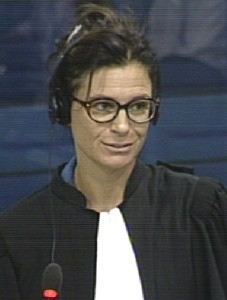
International Civil Party Lead Co-Lawyer Marie Guiraud
The Civil Party lawyers were granted thirty minutes to put introductory questions to the Civil Party. International Civil Party Lead Co-Lawyer Marie Guiraud referred to his Civil Party Application and said that she understood the he first joined the army, then went to Phnom Penh, then to Kratie and subsequently left to Mondulkiri in 1976.[16] Mr. Nem replied that he went to Mondulkiri in 1975. He returned to Phnom Penh for several months and was sent to Kratie with Division 2. Chean Soy was arrested and he was sent to the sector at the provincial level. He was at K-11 for a brief period of time. “However, I was unhappy, because I was forced to get married.” He was called, but this was due to a confusion, as there was another person called similarly to him. He was sent to live in the area where women were living and he was sent to take a bath. However, he was sent back and he was asked whether he “liked it”, but he did not know what they meant. They asked him whether he had noticed any woman who were in the area where he was sent. The next day he was working in the rice fields at K-11. They teased him and he was given three days to think. “During the three day period I became so worried, because I did not know what to do, because I had a fiancé in my village.” After the three days, he agreed t get married, despite his unsettling feelings. “I did that in order to survive so that I could see the open sky again.” He lodged a complaint to the court in order to express his suffering. “I apologized to her that I had married another woman”, as this dishonored his fiancé. The unsettling feelings remained with him until today, he said.
During the wedding day, he respected the organization, although he “felt the sorrow.” Men were ordered to sit on one side and women on the other. The chief made an announcement that they should take each other us wife and husband. They were told that if they were to divorce each other, they would die. “And of course people like Khieu Samphan knew what happened.” He said it was Khieu Samphan’s right to deny knowledge, but that one had to question where this policy came from.
He did not know his wife before the wedding.
“Of course I had to follow the disciplines and instructions.”
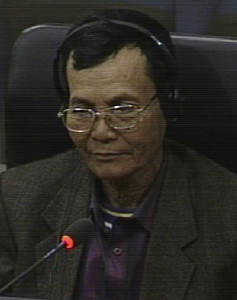
Civil Party Kul Nem
He compared his situation to the prohibition of putting ones “feet into the water while the boat was moving.” Thus, he did not dare to refuse. He had to show that he respected the organization. “I did that in order to survive. Otherwise I would not see my lawyer in this court.” Ms. Guiraud then asked under what circumstances his wife lost the babies. He replied that he had a baby, but he was not mature enough to be born and he was therefore miscarried. “I felt angry at the time, but I kept it to myself. […] We had no right to express our anger.” He took the dead body of his baby to be buried, while his wife was staying at the hospital. His wife was required to work too hard and she became exhausted. “That was the reason for her miscarriage.” This was the reason that he “came here to ask for help”. He said he hoped that people in the later generation would not have to face the same suffering as they did.
Later, after the Vietnamese liberated the country, his wife had another miscarriage. “I felt painful, and that’s the reason why I lodged my complaint with your counsel to express about the harms and sufferings inflicted upon me and my wife. And such incident of having no children did not only happen to me but also to other people.” He said they may have been exhausted, too. “They forced us to work day and night.”
The president instructed the Civil Party not to provide repetitive information. Ms. Guiraud asked the Civil Party to explain what K-11 was. He replied that he was sent from the division. “I was assigned to transplant rice.” Sometimes he had to help the construction work of buildings. Being sent to K-11 was considered a punishment. “I knew that it was somehow punishment, that’s why I didn’t dare to protest the assignment.”
His wife was part of an ethnic minority and they were arranged to get married. He did not know how old his wife was when they got married. “She talked a different language regarding the date. For example, she talked about the corn growing season.” Ms. Guiraud asked whether he had thought about getting separated after the regime. He replied that he wanted to separate, but he could not, since he was already married to her. He chose to apologize to his fiancé and compensated to her. His fiancé got married at a later stage.
Ms. Guiraud asked whether it was a problem that his wife was Pnong. He replied that he stayed with her and that she did not say anything about her. “We lived together with each other peacefully. She did not criticize me and I did not criticize her, so we understood each other, and that’s why we could live with each other.”
At this point, the President adjourned the hearing for a break.
Respect for Orders
After the beak, the floor was handed to the Co-Prosecution. He wanted to know whether he was wounded when fighting the Vietnamese. He replied that he was wounded south of Phnom Penh when fighting Lon Nol.
He got married at the very end of 1977. He was afraid to be sanctioned if he refused to get married. The name of the person who ordered them to get married was called Sophea. He was ethnic Jarai and the chief of the army. Ta Sophea did not survive, since he was arrested under allegations of being traitor. During the regime, they were monitored whether they consummated their marriage or not.[17] They were arranged to get married, but they respected the orders, because they were afraid. He said they would have risked to being killed. To his estimate, his wife was a little bit over 20 years old. Mr. Nem had asked whether she liked him. She had told him that she agreed, because she was scared. “We were all forced to get married.” They were forced to get married with ethnic minorities, despite not liking each other. There were 30 couples in the wedding.[18]
They said that if they did not produce children for Angkar, “we were against the law.” They could not punish them, as they had a miscarriage. Two or three couples represented the group to make a vow.
Phnom Kraol was under the supervision of Leng, Mr. Nem recounted. This was close to another location. He did not know who was detained there, except that some of them were civilians.
Some family members were killed, but he did not know how exactly it happened. With this, Mr. de Wilde concluded his line of questioning.
Nuon Chea Defense Counsel Liv Sovanna asked about the person who took him to the location. He replied that it was a Khmer person called Sean. He asked him whether he liked any women at the location. If they had told him that he was to choose one of the women, he said, “it would have been a different story.” People teased him that he would be matched to a woman. He still did not decide who he liked. He did not know the reason why he was arranged to get married. “I did not know what the arrangement was.” He told them after three days that he had made his decision. Chean Soy had been arrested by that time. When he arrived at the new location, he was put under pressure again. “If I was not afraid then I would not get married.” Mr. Sovanna asked whether this fear “came from inside” him, which the Civil Party confirmed. “People were taken away and arrested,” Mr. Nem said.
Mr. Sovanna asked why he had not mentioned that she was forced to marry in her initial Civil Party Application form and asked on whose initiative he had filed the Supplementary Form.[19] He said that it was on his own initiative. Ms. Guiraud interjected and said that it had been a leading question.
Other people who were arranged to get married also whispered to him that if they dared to oppose, they would be punished. “Because we agreed, we survived.”
It was not his opinion that other people were also afraid. He said that “everyone who got married during the regime said that they were forced to marry.” His fiancé was also aware about this. She lived in Takeo, while he lived in Mondulkiri. He said he had lodged the complaint about the miscarriage also of her second child, because she was overworked during Democratic Kampuchea and that the effect lasted until after the Vietnamese liberated the country.
The floor was granted to the Khieu Samphan Defense Team. Mr. Sam Onn asked whether he was aware of the moral code under Democratic Kampuchea. He replied that men and women worked separately during the regime. If they met each other, the respective unit chiefs would question them. “They simply took me and I had no idea for what purpose they took me. […] Only later was I aware that they took me to look at women.” Nay called him out, but he did not know why. Mr. Sam Onn asked whether “taken out to have a look at women” were his own words and not the ones of the unit chiefs, which the Civil Party confirmed.
With this, Mr. Sam Onn concluded his line of questioning. The Civil Party requested Nuon Chea and Khieu Samphan to “tell the truth” and asked the court to make sure that the later generation would not face the same fate. The president thanked the Civil Party and dismissed him.
New Civil Party: Nget Chat
Civil Party Nget Chat was born in the year of the rooster in Rung Ta Kok Village in Bakan District of Pursat Province, where she also lives today. She had two children with her first husband and four children with her second husband.
Ms. Guiraud gave the floor to her colleague Lor Chunthy, who asked her where she lived in 1975. She replied that she lived in Pursat Province and brought her children and husband to Rumlek Worksite. They built shelters to sleep and ate collectively. Mr. Chunthy inquired about an incident when her husband went to work and she was waiting for him at an office. She recounted that there was no remarkable incident in 1975. She said that the incidence he referred to took place in 1978. She was transferred to Thnal To Teng. A few months later, she was assigned to collect corn. “I left the battlefield along with my children and husband. It was at noon: I saw people being walked away to be executed. I asked them where those people were taken to, and they said they were taken to collect corn, and they asked me why I did not go along with those people. I told them that I was waiting for my husband to bring along the children. They asked me whether I came here with my family, and I said yes. They asked me where was my husband, and I told them my husband had gone to fetch my children. That Comrade Suon told him that she should not go and I should only let my husband go with those people.”
Her husband asked her why she did not go along with them, and she told him that Suon had told her not to go with them and that only he should go. Her husband begged her to go with them. “Finally, I agreed to go. We all wept. I did not want to go, but my husband tried to convince me to go with him. My husband walked in the first row.”
She was taken elsewhere. “At about 7 pm, while I was sleeping in the long shelter, reserved for the elderly women, I saw militiamen, including Suon, who came and their hands were carrying swords and the swords were stained with blood. And they asked me whether I recognized anything, and I told them that I recognized the clothes of Comrade Paen. I was so [scared] at the time.” She assumed that her husband had been killed.
Mr. Chunthy asked whether anything happened to her at this incident, which she denied. She recounted, however, that she was forced to marry around a week after this incident. “When we arrived at the venue, I noticed there were many people at the venue. When I arrived, I was told that I would be required to marry and I had no idea which man I would be matched up with.” She followed a person to the venue. The ceremony took place around three or four days after the disappearance of her husband. “I still wept at the loss.”
Her family, who were all Kampuchea Krom, were all taken away and killed. “They referred to them as Kampuchea.”
Mr. Chunthy asked whether she was advised of the purpose of the marriage.
They told us to make commitment. I look at the face of my spouse and he was very old. I was only 20 year old, and he was much much older than me. I did not dare to protest, since they said that if I opposed, I would be sent to the upper level.
Asked how she felt at the time, she said that “it was beyond any word to describe. […] I felt intimidated and frightened.”
They were given a small shelter to spend the night together. They consulted each other and decided that they should not oppose and keep quiet instead, because there were militiamen walking nearby the house. “We saw cases where people were taken away to be killed.” When Mr. Chunthy asked whether she had seen them being taken away, she said her husband had.
The President adjourned the hearing. It will continue tomorrow at 9 am with the impact statements of Ms. Chat and Civil Party 2-TCCP-1068, followed by witness 2-TCW-289.
[1] E3/9820.
[2] E3/9820, at answer 13.
[3] E3/9820.
[4] At answer 34.
[5] E3/4905, at 00541272 (KH), 00906245 (FR), 01060889 (EN).
[6] E3/4905, at 00451273 (KH), 00906248 (FR), 01060690 (EN).
[7] E3/9820, at question 21.
[8] E3/6407a, at 00580715 (KH), 00850589 (EN), no French translation available; E3/4905, at 00541273 (KH), 01060690 (EN), 00906248 (FR).
[9] At 00580715 (KH), English ERN ends at 89 (EN)
[10] E3/4905, at 00451273 (KH), 00906248 (FR), 01060690 (EN).
[11] At 00850589 (EN).
[12] E3/10710, at 01329217 (KH), 01337495 (EN), 01337595 (FR).
[13] E3/9820, at
[14] E3/4905, at 00541273.
[15] At 01329217 (KH), 01337395 (EN).
[16] E3/4983, at 00912331 (FR), 00555888 (KH), 01060708 (EN).
[17] E3/2593.
[18] There were different translations throughout the day: Thirty people and thirty couples.
[19] E3/6570; E3/4983.
Featured Image: Civil Party Preap Sokhouem (ECCC: Flickr).

